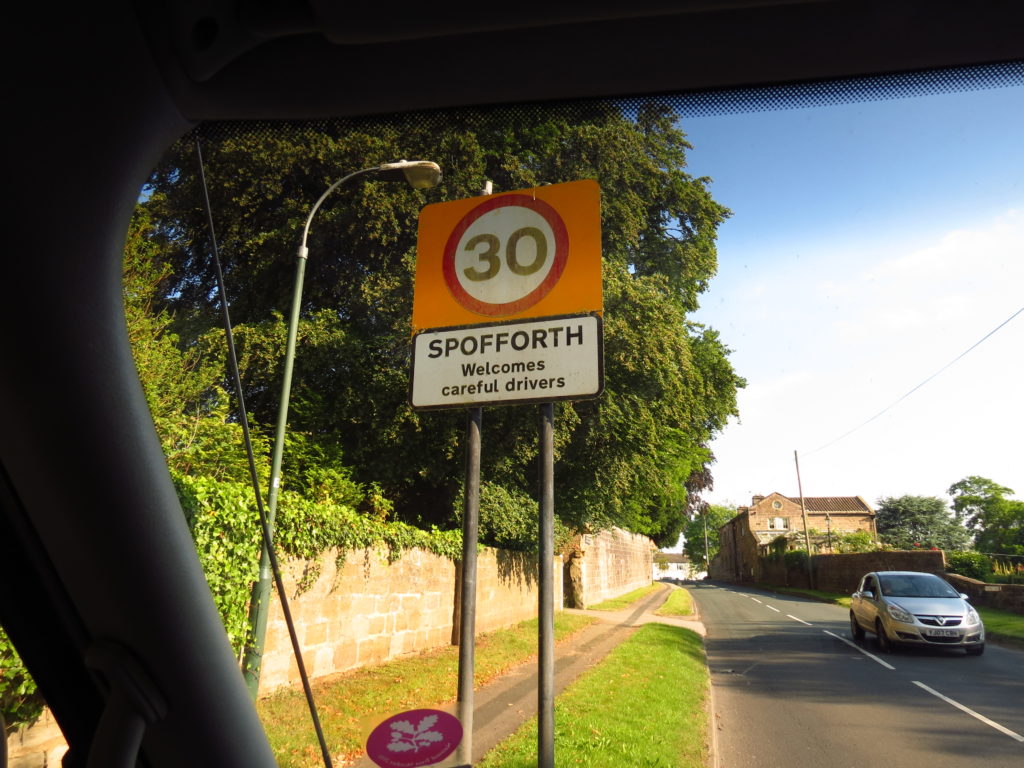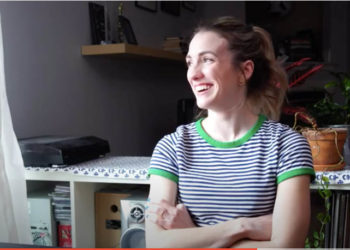When I was a child, we had a small black book in our bathroom called The Meaning of Liff, by Douglas Adams and John Lloyd. It is a “dictionary” of place names, in which each is given a definition. Or, to put it another way, a “dictionary of things that there aren’t any words for yet”. So “Spofforth” is defined as “tidying up before the cleaner comes” and “Massachusetts” are “those items and particles which people who, after blowing their noses, are searching for when they look into their hankies.” “Silesia” is “not knowing, at the critical moment, which side of the boat it is best to be sick off.”

The one we used most commonly in my family is “Woking” — “standing in the kitchen wondering what you came in here for”. It became a favorite, of course, because it was so common, and so true. And many years after publication, it was explained scientifically by “the Doorway Effect”. A study published in the Quarterly Journal of Experimental Psychology showed that “people were two to three times as likely to forget what they were supposed to do after walking through a doorway.” Quoted in the LiveScience blog, lead researcher Gabriel Radvansky, a psychologist at the University of Notre Dame, said:
When we are moving through the world, it is very continuous and dynamic and to deal with it more effectively, we parse things up. …Entering or exiting through a doorway serves as an ‘event boundary’ in the mind, which separates episodes of activity and files them away. Recalling the decision or activity that was made in a different room is difficult because it has been compartmentalized. …[T]he act of passing through doorways, rather than the fact of being in a different environment, kills memory.
And from Scientific American‘s coverage: “some forms of memory seem to be optimized to keep information ready-to-hand until its shelf life expires, and then purge that information in favor of new stuff. Radvansky and colleagues call this sort of memory representation an “event model,” and propose that walking through a doorway is a good time to purge your event models because whatever happened in the old room is likely to become less relevant now that you have changed venues.”
I learned about the Doorway Effect from the TV show QI – which, ironically, was created by John Lloyd, and yet neither the show’s presenter nor its contestants referred to Woking or the Meaning of Liff during the segment on the Doorway Effect. What they did posit was that it is an evolutionary characteristic — to paraphrase from memory, as you leave the cave, you put aside your thoughts about fire risk, in order to focus instead on the risk of bears or whatever other dangers you might find outside.
I’m writing about the Doorway Effect here and now because I think it has relevance to those of us in lockdown. The journal article, and the associated coverage in the media, positioned the Doorway Effect in something of a negative light, or perhaps just as an amusing evolutionary leftover — gah, we go from the living room to the kitchen and can’t remember things. But of course, we wouldn’t have retained this evolutionary characteristic if it weren’t useful to us. And those of us in lockdown are starting to realize how useful it is. In just one half-hour meeting yesterday, the following comments were made:
- “I miss my commute! I thought I hated it, but I realize now it was a valuable buffer between work and home life, during which I could process my residual work thoughts and get myself into home mode.”
- “I can’t cope with the endless Zoom meetings. It’s too much for my brain to handle. At least in real life you get to walk from one room to another.”
Yes, there are wider reasons why we like being in the car, alone with the radio, or why it’s nice to stretch your legs and breathe some different air as you fortify yourself for the next meeting. But maybe we are also missing the Doorway Effect. Without crossing thresholds, we are going from meeting to meeting, from work to supper, without “purging” the information from the previous context. We are clicking our way into the next call with a brain already full of the previous background data, discussion points and actions — and trying to stuff more in there — and then more, when we join the call after that. And then we are going straight into a family supper while still trying to deal with all that information, all those worries.
Lots of seasoned remote workers talk about the value of a virtual commute — whether that’s going for a walk around the block before and after home-working periods, or even just setting up a workstation in a relatively unused room such that emerging from it and walking across the hall or down the stairs acts as a transition. The Doorway Effect would suggest there is some science behind what they have experienced — and that we should all add a little Woking to our day if we want to get through lockdown with our sanity intact.
Discussion
28 Thoughts on "Woking, the Doorway Effect, and Who Knew You’d Miss Your Commute So Much?"
Living (and working) in Woking, this has made me smile! And I thought the town would only be remembered for its Pizza Express this year – never thought we’d get a Scholarly Kitchen headline!
I’ve learned something equally surprising, as a citizen of Massachusetts!
This elegant description of the magic that walking through a doorway has on our minds really made an impression on me. I think that’s what I’m missing in this weird world we are living in right now, interacting in person with my colleagues, the daily commute, the transition from “home” to “workplace,” and the opportunity to walk down long hallways, and pass through multiple doorways, a metaphor for something … that … I … just … can’t recall now….
The first three weeks or so, I found it jarring to be on a Zoom/GoToMeeting/Google Meet call and then to have people just disappear at the end. I almost needed a fade to black screen. Happily, I’ve acclimated to this reality.
Love this. I’ve been lucky not to have a ton of calls, but I’ve definitely noticed a need for those buffer times, whether it be the physical act of putting all work stuff away at the end of the day or having a half hour of chill out time before picking up evening activities.
The other thing this reminded me of was story structure. In stories, there is usually what is called the “threshold” or sometimes “door number 1,” usually placed at around the 25% mark. It marks the spot in the story where the protagonist leaves their old ordinary world (i.e. old way of living) behind to begin their adventure in the “new” one (i.e where they’ll need to wrestle with a new way of living). Examples: Frodo and Sam leaving the Shire, Peeta and Katniss on the train out of District 12, Harry going to Hogwarts, etc.). Maybe not very pertinent to working from home, but it is the point in the story where the protagonist actively chooses to leave the old behind, which, in the context of the larger story is equivalent (whether the protagonist knows it yet or not) to setting out on the process of ultimate change the story will bring, which will, as the Doorway Effect suggests, render their old way of living obsolete.
Again, maybe not as pertinent to the post, but as a story nerd, I couldn’t help it! Anyway, great post that I’m definitely going to share with colleagues.
My office is in the attic–it used to be my older daughter’s bedroom before she grew up and moved away (talk about a transition!). I get up and walk downstairs several, okay many, times a day, often for no reason. Well now I know there _is_ a reason! Thanks, Charlie!
I can see that I have been beaten to being the first to claim first hand knowledge of Woking. Having lived there for a number of years during my childhood I have moved on (though members of my family still remain so do visit).
Reading this was quite startling, as I have to say there were may times I stood in the middle of Woking town centre and thought ‘what am I doing here’?
Sadly no doorways were needed for that.
Haha! At one point during my childhood we lived in Didcot. I always loved the quirky, offbeat, fanciful detail of the second sentence!
Didcot (n.) The tiny oddly-shaped bit of card which a ticket inspector cuts out of a ticket with his clipper for no apparent reason. It is a little-known fact that the confetti at Princess Margaret’s wedding was made up of thousands of didcots collected by inspectors on the Royal Train.
Thank you for this! I had not heard of the Doorway Effect before and I am very grateful to learn that it might not be early-onset dementia after all…
It does argue for doing your work in a room with an actual door, rather than an open space, so that you can make use of opening and closing a door. In our house, we can walk continuously through all the rooms on the first floor. Although I would not really like to work in my upstairs spare room, perhaps leaving that room and shutting the door there would give me the “closure” I need when leaving a meeting.
Wonderful. My first job out of college was as a newspaper reporter. We were all in one big open newsroom. There was a separate room off the side that was “the Library.” Two women worked there and they clipped and filed all the news articles (this was all in print because I am that old). Every single time I entered that room to find something, I completely forgot what I was looking for when I walked in. I thought it was some sort of sorcery, that the doorway had magical powers. I started having to write down what I needed and carry it in with me to save me the walk back to my desk. After some time, I realized that it wasn’t so much the magical powers of the doorway, but rather the woman in charge of the library that always looked up from what she was doing to say hello when you walked in.
Until reading this post I had not heard of your definition of Woking, but I do remember that the former Observer journalist Paul Jennings once outlined his own list of redefinitions of place names. The one that sticks in my mind is Wembley: a mild physical reaction to adverse circumstances as in “the prospect of coping with half a dozen end to end zoom meetings is making me feel decidedly Wembley”.
Thanks for the insights and the humor. The Meaning of Liff sounds like it was written by Monty Python.

